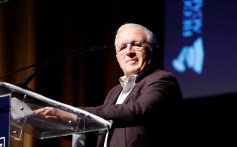Business
Page: 20
Trending on Billboard
Here’s a story that captures everything wrong with Washington: Billion-dollar corporation asks Congress to force car manufacturers to install AM radio in every vehicle — a government tech mandate worth billions of dollars to its bottom line — while refusing to pay the artists and rights owners whose music is the very foundation of their business.
Last Congress, lawmakers such as House Democratic Leader Hakeem Jeffries saw through this scheme and stood firm. Radio lobbyists went home empty-handed. Now they’re back, asking for the same corporate handout, and still refusing to pay artists a dime.
Related
Before you say, “But who listens to AM/FM radio in 2025?”, ask yourself this question: Why are corporate radio lobbyists fighting so hard for this government mandate? Because keeping radio in cars is worth almost $14 billion in advertising every year. And why is it worth that much? Because hundreds of millions of Americans still listen to AM/FM radio every week.
Big Radio spent over $13 million lobbying Congress last year, which doesn’t even include the millions they contributed to political campaigns, to protect their golden goose at the expense of artists.
Corporate radio lobbyists engage in a cynical game of claiming something we all know isn’t true. They claim artists should be satisfied that “promotion” on radio is good enough compensation. But the days of Americans discovering music on AM/FM radio are long gone. Social platforms like YouTube and TikTok are where music breaks now. Last year, 84% of Billboard Global 200 songs went viral on TikTok first. Radio adapted by abandoning discovery and repeatedly playing popular songs radio listeners already know — in a single day recently, one iHeart station played songs by six major artists 112 times. One station. In a single day. Without paying a penny to the performers.
That isn’t promotion. It’s exploitation.
Related
That’s why the last Congress rejected radio lobbyists’ efforts to pass the AM in Every Vehicle Act. And why they must again reject it unless radio corporations agree to tie it to the American Music Fairness Act that ensures artists are paid fairly for radio plays.
Under the American Music Fairness Act, small and community stations would only have to pay between $10 and $500 a year to play all the music they want. The bill also gives radio corporations the opportunity to tell the independent Copyright Royalty Board what they think the performance royalty rate should be. If radio conglomerates believe their airplay has promotional value, they can make their case.
For some reason, AM/FM radio companies think they are special and that the principles of copyright shouldn’t apply to them. Every other platform pays artists for the work they do. Spotify. Pandora. SiriusXM. Only AM/FM radio — the most established music platform — claims it should be exempt from this concept.
For years, corporate radio lobbyists engaged in cynical practices to block music legislation. But now they are the ones who want Congress to act. And that gives music creators power — and they are speaking out with one voice.
Related
Over 300 artists – from Aerosmith to Barbra Streisand to Jelly Roll to Mariah Carey – wrote Congress earlier this year calling for passage of the American Music Fairness Act. This was an unprecedented display of artist unity for fair pay.
And just this week, Boyz II Men, Gloria Gaynor, Mike Love, Sammy Hagar, Smokey Robinson and others called on congressional leaders to pair the AM bill with the American Music Fairness Act. Their message was simple: “When you save the radio industry by mandating its technology remain in cars, we ask that you save the musician too and allow us to be paid fairly when our music is played.”
Artists have never been this fired up. Perhaps that’s because, like the rest of America, they are fed up with our workers being taken advantage of. This is about priorities. Big Radio corporations want Congress to mandate that their product be installed in every new car sold in America — government intervention to protect corporate profits. Meanwhile, musicians are simply asking to be paid for their work.
The solution is simple: If radio corporations want billions in government-mandated protection, they need to start paying the workers whose labor generates their wealth.
No corporate handouts without worker fairness. No radio without royalties.
Michael Huppe is the president and CEO of SoundExchange, where he champions creators and spearheads the use of technology, data and advocacy to power the future of music. To date, SoundExchange has distributed more than $12 billion in digital performance royalties to a growing community of more than 800,000 music creators. Michael is also an adjunct professor at Georgetown Law School, a published author, lecturer and active community member. He is a member of YPO, Forbes Business Council, and Fortune Brainstorm Trust, with opinions published in Variety, Rolling Stone, The Wall Street Journal, Music Business Worldwide, Billboard and The Hill.
Trending on Billboard
Spotify is facing a class action lawsuit claiming its Discovery Mode and editorial playlists are a “modern form of payola” that allow record labels and artists to secretly pay to promote their music.
The lawsuit, filed on Wednesday (Nov. 5) in New York, alleges that Spotify’s recommendation tools are a “deceptive pay-for-play” program, but that the streamer misleads consumers into trusting that they are neutral and based on personal musical tastes.
Related
“Spotify exploits that trust by marketing itself as a platform that offers organic music recommendations — whether through its algorithmic or curated playlists — only to secretly sell those recommendations to the highest bidder,” reads the lawsuit, obtained by Billboard.
The case was filed by a Spotify subscriber named Genevieve Capolongo, who seeks to represent “millions” of other users who were allegedly misled by Spotify’s offerings. Her lawyers say she used the platform’s personalization features for years, but “kept hearing the same major-label tracks” that “bore little resemblance to her listening habits.”
In a statement to Billboard, a spokesperson for Spotify called the accusations “nonsense” and pointed to its detailed explanation of the program.
“Not only do they misrepresent what Discovery Mode is and how it works, but they are riddled with misunderstandings and inaccuracies,” the company said. “Discovery Mode is a feature artists can use to flag priority tracks for algorithmic consideration in limited contexts: Radio, Autoplay, and certain Mixes. It doesn’t buy plays, it doesn’t affect editorial playlists, and it’s clearly disclosed in the app and on our website.”
Related
The new case is the latest to claim that major labels are buying placement on Spotify to boost their artists. The high-profile lawsuit filed by Drake over Kendrick Lamar’s “Not Like Us” included accusations that Universal Music Group used bots and payments to juice the song’s popularity on many platforms, including Spotify. Another case, filed earlier this week, claims that Spotify “turned a blind eye” to bots and other forms of fraudulent streams designed to inflate certain artists.
First unveiled in 2020, Discovery Mode allows artists and labels to get boosted on Spotify in return for accepting reduced royalties. It was initially met with scrutiny, including a Congressional investigation, over its similarities to payola, or the practice of secretly paying radio stations for airplay. But it has become a popular industry marketing tool around the release of new music.
Much of Wednesday’s lawsuit is focused on the extent to which Spotify discloses the exact parameters of Discovery Mode to its users. Though listeners are offered a link to an “About Recommendations” explainer when using it, Capolongo’s attorneys say that isn’t enough.
“Telling users that ‘commercial considerations may influence’ recommendations does not reveal which songs are being promoted commercially and which are being recommended organically,” her lawyers write. “Without that specificity, users cannot distinguish between genuine personalization and covert advertising.”
Related
The lawsuit also claims that Spotify’s editorial playlists, like the hugely influential Today’s Top Hits and RapCaviar, are also subject to pay-for-play. But it fails to offer any concrete examples of such payments, citing only unnamed “industry insiders” confirming that it happens and circumstantial evidence about the “disproportionate” rates of major-label music on such playlists.
In technical terms, the lawsuit claims Spotify’s conduct violated New York state law with deceptive practices and false advertising. It also claims Capolongo was fraudulently induced to subscribe and that Spotify was unjustly enriched by its behavior.
In more straightforward language, Capolongo says she simply wouldn’t have paid for Spotify if she had “known the truth” about the service: “That Spotify’s playlists and recommendations are shaped by undisclosed pay-for-play arrangements and hidden commercial incentives, not by her listening history alone.”
Trending on Billboard
David Israelite’s guest column on October 23, 2025 explained how little music creators get paid across different streaming services. I just want to lay out the facts and be clear: YouTube pays the least for music, full stop. They always have and always will unless someone stands up to them. They’ll throw up smoke screens and tempt you to look the other way, but let’s not be fooled.
YouTube recently touted that it paid artists $8 billion over the past year. This sounds impressive, but it’s not. During the same period, Spotify generated roughly $18 billion in revenue and paid about $12 billion to music rights holders — nearly 67% of its revenue. By contrast, YouTube generated $60 billion in revenue and paid only $8 billion to rights holders — about 13%. YouTube will say they’re not just a music service. But I would argue that YouTube never would have become such a successful platform without music, and even if only one-third of their revenue comes from music (and it’s likely higher), they certainly should be paying more than Spotify, not 50% less.
Related
How does YouTube pay less than their competitors? They are a behemoth bully. They have 2.7 billion monthly active users and more than $60 billion in annual revenue. It’s the dominant video platform, with more hours streamed than Netflix. It’s the largest music service, with more users than Spotify. And in the “traditional” TV space, it’s on track to surpass Comcast as the largest U.S. cable provider. This company now owns audience and content delivery in a way the world has never seen before.
Their tyranny isn’t just limited to music. If you read the headlines, you will see a pattern of coercion: YouTube vs. Televisa/Univision. YouTube vs. NBCUniversal. YouTube vs. Fox. YouTube vs. Paramount. And now YouTube vs. Disney. The playbook is always the same: if you refuse to accept YouTube’s below-market terms, YouTube threatens to go dark until you capitulate. They then shift the blame and spin the story — when in reality, YouTube just wants to pay less.
And now they’re trying to dictate terms to consumers too. If you’re a YouTube TV subscriber, you received an email saying “if Disney’s content is unavailable for an extended period of time,” YouTube will give you a paltry $20 credit. So, YouTube gets to unilaterally decide for consumers how long is too long and how much ESPN is worth to them? They bully the people creating the content and then they bully the consumers who want access to it.
Related
Disney understands that “content is king,” but at YouTube, content is just a pawn in their game. And the game at YouTube is clearly about aggregating services and market power (across Google and YouTube) and using that market power to strong-arm everyone in the ecosystem — rights holders, content creators, advertisers, everyone — for their own financial gain. YouTube is showing us what happens when unchecked power and greed collide.
Thankfully, Disney is standing up to YouTube, and we all need to support Disney because enough is enough. As artists, consumers, and companies, let’s voice our support for Disney in this battle with YouTube. And in parallel, Washington needs to take a good hard look at YouTube’s abuse of market power and explore whether it’s time to break up Google so that YouTube, YouTube Music, and YouTube TV are separate businesses that finally have to compete on a level playing field.
YouTube: without the artists, athletes, and actors, there is no business.
Irving Azoff holds the title of chairman and CEO of The Azoff Company and is the personal manager of the legendary Eagles, Jon Bon Jovi, U2, John Mayer, Van Halen, Gwen Stefani, Steely Dan, Maroon 5, and many others. The Azoff Company is a privately held media and entertainment company dedicated to investing in positively disruptive businesses that put artists and fans first. Azoff was inducted into the Rock and Roll Hall of Fame in 2020.
Trending on Billboard
Milwaukee’s newest live entertainment hub, The Argo, will officially open its doors next month inside the historic Fox Bay Theater in Whitefish Bay, anchoring a full-scale renovation of the 1949 Art Deco building and marking the debut of a new mid-size venue for the region’s touring circuit.
The 700-capacity space — which includes a full bar and restaurant, ballroom, and flexible event areas for private rentals, weddings, and community programming — will host its first public concert on Dec. 5 with performances by local artists Chris Haise Band and Zach Pietrini alongside Nashville alt-pop trio VEAUX. The event doubles as a fundraiser benefiting Milwaukee music education programs.
Related
The following night (Dec. 6), Milwaukee rock favorites Goran and Morgan of The Gufs will headline The Argo’s grand-opening celebration, marking the 30th anniversary of their 1995 album Collide.
More than 40 concerts are booked between December and spring 2026, with a mix of touring acts, regional artists and thematic dance parties. Highlights include Grateful Dead tribute act Another One, bluegrass veterans NewFound Road, Minnesota rock band Remo Drive, punk mainstays The Casualties and bluegrass singer Dan Tyminski. A rotating Wednesday swing-jazz residency will feature groups including The Flood, The Sazerac 5, Micro Brew Swing Band and Old Sam & The Teardrops.
The Argo’s ownership group — Andrew J. Coate, Adam Powers and Josh Bryant — completed the venue build-out in under five months after receiving revitalization approval earlier this year. The team has instituted a permanent give-back model, pledging $1 from every ticket sold to support music-industry wellness, with an emphasis on mental health, sustainability and career longevity.
“We’ve lived every angle of this industry — we’ve seen the best of it, we’ve felt the burnout,” Coate says. “The Argo is our way of tipping the scales back toward the good — for our peers, for our city, and for the next generation coming up behind us.”
Talent buying for the venue will be handled exclusively by Knitting Factory Entertainment’s live division, Knitting Factory Presents, led by SVP James Irvine. “This is just the start for The Argo,” Irvine says. “The space is built the right way — production, hospitality, artist amenities — and it has the backbone to become a real destination for touring artists.”
The venue’s bar and kitchen will be helmed by chef Dan Jacobs — a five-time James Beard semifinalist, 2024 nominee and co-owner of Milwaukee restaurants EsterEv and DanDan. The restaurant will soft-open Dec. 5 with a limited menu and will operate independently from ticketed events, allowing locals to dine without attending a show.
Additional partners include exclusive ticketing provider Eventbrite, developer New Land Enterprises and design-build firm Three Sixty Design, whose past work includes Café Centraal and the Milwaukee Athletic Club.
“After months perfecting this venue and the customer experience, we’re finally ready to show our faces to Milwaukee and the world,” Coate adds. “We’re looking to become a must-stop for local artists, prominent touring acts and fans of almost every kind of music.”
The Argo
Three Sixty
The Argo
Three Sixty
A calendar of upcoming dates at Argo is below:
Dec 05 Public Soft Opening ft. VEAUX w/ Zach Pietrini, Chris Haise BandDec 06 Public Grand Opening ft. Goran & Morgan of The Gufs Celebrating 30th Anniversary of CollideDec 10 Swing Jazz Wednesday featuring Old Sam & The TeardropsDec 12 The First Wave (80’s New Wave Tribute)Dec 13 Birth-Tay (Taylor Swift Dancy Party)Dec 17 Swing Jazz Wednesday featuring. The FloodDec 19 Another One (Grateful Dead Tribute)Dec 20 Second Hand News (Fleetwood Mac Tribute)Dec 24 Free Holiday Film ScreeningDec 26 Free Holiday Film ScreeningDec 27 Free Holiday Film ScreeningDec 28 Free Holiday Film ScreeningDec 31 Steve Beguhn Presents “New YearS’ teve”January 2026Jan 07 Swing Jazz Wednesday featuring The Sazerac 5Jan 09 An Evening with Field ReportJan 10 Gabriel HarrisJan 11 School of Rock ShorewoodJan 17 Violet WilderJan 14 Swing Jazz Wednesday featuring Old Sam & The TeardropsJan 23 The Midnight PurchaseJan 24 Pat McCurdyJan 28 Swing Jazz Wednesday featuring Micro Brew Swing BandJan 30 Fool House (90s Dance Party)Jan 31 Hot In Herre (00’s Dance Party)February 2026Feb 04 Swing Jazz Wednesday featuring The Sazerac 5Feb 11 Swing Jazz Wednesday featuring Old Sam & The TeardropsFeb 12 NewFound RoadFeb 15 Whitefish Bay High School Music ClubFeb 18 Swing Jazz Wednesday featuring The FloodFeb 20 Remo DriveFeb 25 Swing Jazz Wednesday featuring Micro Brew Swing BandFeb 28 Jump (Van Halen Tribute)March 2026Mar 04 Swing Jazz Wednesday featuring The Sazerac 5Mar 07 ScythianMar 11 Swing Jazz Wednesday featuring Old Sam & The TeardropsMar 18 Swing Jazz Wednesday featuring Micro Brew Swing BandMar 25 Swing Jazz Wednesday featuring Micro Brew Swing BandMar 28 Bangers Before BedComing SoonApr 03 Not Quite Brothers (Classic Rock Tribute)Apr 10 Smells Like NirvanaMay 16 The CasualtiesMay 29 Dan TyminskiJun 18 Thurston Howell (Yacht Rock Tribute)Aug 8 The Pork Tornadoes
Trending on Billboard
Andrew Del Villar is set to take over as the new CEO of regional Mexican music powerhouse Del Records. The transition that he and his dad, Ángel Del Villar, have been “planning for years” will take effect Thursday, Nov. 6.
The 26-year-old will step in amid his dad’s legal battles as he faces a prison sentence that will begin on Dec. 1. Over the summer, Ángel was sentenced to four years in prison following his conviction on felony charges of doing business with a concert promoter linked to Mexican drug cartels. Now, the California-based indie record label — founded by Ángel in 2008 and previously home to música mexicana giants like Eslabon Armado, Ariel Camacho and Gerardo Ortiz — is looking to enter a new era with a new leader in tow.
“While we never talked about when this transition would actually happen, I’m excited because my dad and I had been planning this for years, it’s been a while and it’s finally happening,” Andrew tells Billboard over Zoom, just days before stepping into his new role.
Related
Previously Del Records’ COO, Andrew began working for his dad’s company as a teenager and mainly worked behind the scenes, booking theater or arena shows for the label’s roster and flagging artists on social media that he thought his dad should sign, including sierreño acts Eslabon Armado and T3R Elemento.
“I started getting involved like 7 or 8 years ago and started from the bottom; collecting tickets, charging when we were doing the nightclubs, and booking U.S. shows in theaters and arenas,” Andrew says. “Then, I kinda of became A&R, sending my dad artists I was finding on social media. I would say, ‘Hey, what do you think about them?’ Just like my dad, I have a good ear and can identify who has potential.”
While Andrew is open to branching out to different genres, for now, Del Records will continue to focus on signing música mexicana acts. “[Regional Mexican] has been our bread and butter,” he adds. “DEL has done a lot over the years, and I want to keep that legacy alive, and keep signing artists and build them from the ground up,” he explains. “But this new era will differentiate from my dad’s run because I will launch new marketing and promotion strategies, leaning heavily on social media. That’s the biggest marketing you can invest in. There’s more to just posting on social media, you need a team dedicated to taking that post to the next level.”
Ángel del Villar & Andrew del Villar
Patty Othon
Andrew is revamping his dad’s “Canta Con Del” initiative that launched 10 years ago, inviting local California acts to sing at the family’s restaurant for a shot at getting signed by the label. Andrew will relaunch that initiative but open it to artists from all over the world who can submit their songs/performances on social media. “There’s talent everywhere and we want people to be heard and get an opportunity,” he says.
Over the years, Andrew gained confidence to make decisions, encouraged by his dad to find his voice. “He would tell me, ‘Hey, mijo, whatever you want to say, whatever you want to do, let’s roll with it.’ He’s given me that confidence to speak up.”
Related
Andrew further adds, “My dad has always been my role model, everything that has been thrown at him is a lot, we’ve had these talks for years and he’s always been positive about everything. He’s told me to never let things get to me because in our genre, and the industry in general, people don’t wish you well. But never let the negativity get to you.”
Del Records’ roster today includes Lenin Ramírez, Yahir Saldívar, Sucesión M and Panchito Arredondo, plus newly added acts Marco Granillo, Andi Luan and Cobian Montana.

Trending on Billboard
A former manager of Guns N’ Roses claims in a new lawsuit that the band has unfairly blocked the release of his autobiography by threatening to sue him and his publisher as he tries to “tell his story.”
Alan Niven, who managed the iconic rock band during its late 80s heyday, claims that GNR has wrongfully invoked a confidentiality clause in his 1991 termination contract and made “repeated threats” of legal action over the memoir, Sound N’ Fury: Rock N’ Roll Stories.
“Due to GNR’s threats, Sound N’ Fury languishes in a warehouse,” Niven’s attorneys write in the lawsuit, which was obtained by Billboard. “Thousands of copies of Sound N’ Fury have been printed and continue to incur storage expenses.”
Related
Niven says his book “includes stories involving the members” of the band like Axl Rose and Slash, but that the contract is clearly unenforceable. He says that GNR members have also repeatedly discussed his role in the band’s history – meaning he’s allowed to speak about it too as a matter of free speech.
“These public disclosures by defendant’s members and agents have collectively placed the relevant facts of the band’s relationship with plaintiff into the public domain and made them matters of public interest,” Niven’s lawyers write. “Enforcement of the confidentiality provision would be illegal and in violation of the Constitutional protection of free expression.”
A rep for Guns N’ Roses did not immediately return a request for comment on Wednesday.
Niven started managing Guns N’ Roses in 1985, shortly after the band solidified its best-known lineup: Rose, Slash, Izzy Stradlin, Duff McKagan and Steven Adler. And he was there for GNR’s rise to stardom with the chart-topping Appetite for Destruction, which featured smash hit singles like “Welcome to the Jungle,” “Paradise City,” and “Sweet Child o’ Mine.” Niven was fired in 1991 by Rose, who reportedly refused to release the band’s next album until Niven was gone.
As Niven tells it in his lawsuit, he was instrumental in the band’s success: “Niven’s work with GNR is the stuff of legends, as he took them from nowhere to headlining Wembley Stadium in less than six years.”
Related
After he was “betrayed” and fired by the band, Niven admits that he signed a “buy out” agreement covering the terms of his exit. He says it contained a “privacy/confidentiality” provision that required both sides to avoid sharing information about the other learned during their long partnership.
But Niven says that in the years since, GNR members have made “many references” to him, including “inflammatory or even defamatory” ones. He specifically cites several examples, including a 2008 magazine interview in which Rose suggested that Niven was “always tryin’ to convince someone they should fire me” and was seeking a “a personal pay day” from their record label.
“Members of GNR have mentioned Niven, sometimes in a derogatory [way], starting at least as far back 1991,” his lawyers write. “Niven’s comments about the band are thus justified by the agreement, which allows him to comment on matters raised by the band first.”
He also claims the agreement is void for an even simpler reason: That Hudson, McKagan and Stradlin signed the deal, but that Axl himself never did so: “It is unclear who is attempting to enforce the agreement now, and whether they have standing to do so,” his attorneys say. “Rose did not sign the agreement, and one signatory (Stradlin) has remained silent.”
In technical terms, Niven is seeking a “declaratory judgment” that the 1991 contract is unenforceable, or that he is not violating the terms of it by releasing his book. He is also suing the band for damages over accusations that it “intimidated” his publisher into delaying the books release.
“Defendants’ interference has resulted in damages to Niven from lost sales and lost reputation in the market for his book and life story, only a fraction of which has anything to do with Defendants’ rock group,” he says. “Individual advance orders have been cancelled. The books have incurred storage fees. Niven’s momentum in the press has been destroyed.”
Trending on Billboard
Ed Sheeran has celebrated a major victory for his music education campaign as the U.K. government confirmed on Wednesday (Nov. 5) that music lessons will be taught more widely in schools.
Earlier today a major review of the National Curriculum – which dictates what subjects and topics are taught in non-fee-paying state schools – was published by the Labour government. The changes are the first in over a decade, and will see a number of modern topics (such as artificial intelligence) enter the classroom.
Related
The report says that arts subjects will also be “revitalised” and will see the scrapping of the English baccalaureate (EBacc), which critics – including Sheeran – said limited subject choice for students at a GCSE level (ages 14-16). Under the program, introduced in 2010 by then-education secretary Micahel Gove, pupils were required to study a minimum of seven GCSEs, including maths and a language, but the options did not include any arts subjects.
In March, Sheeran called on U.K. prime minister Sir Keir Starmer to scrap the Ebacc, deliver £250 million in spending towards music in a classroom environment and enlist more teachers for music subjects. His letter was backed by over 600 signatories, including Sir Elton John, Harry Styles, Coldplay and more. He also launched the Ed Sheeran Foundation in January to help support careers in music.
“We are at a critical point: a future of no music in state schools, no music teachers to teach, broken instruments and no grassroots venues,” he wrote in his letter. “As a young music student and aspiring artist, I benefited from opportunities in and out of school to learn and grow. Unfortunately, after decades of defunding and de-prioritising, music is no longer a right for all children – it’s a luxury for only a few.”
Sheeran’s efforts have now been recognized both by Starmer and Bridget Phillippson, secretary for education. The former sent a direct response to Sheeran saying that his “voice had been heard”. During her speech in parliament on Wednesday, Philippson credited Sheeran for speaking “so powerfully” on the subject. The final curriculum will be published in spring 2027, and schools will begin teaching it from September 2028.
Sheeran has responded to the news and the success of his letter, writing “With the help of the letter and everyone who signed it, I’m happy to say that some of the key points we raised have been recognized by the government today, marking the first change to the music curriculum in over 10 years. This involves diversifying the music genres taught in schools and removing outdated systems that stop kids from studying music and the arts as part of their school day. These changes give young people hope and the opportunity to study music.” See his full statement below.
The topic of music education was raised by a number of British artists at the BRIT Awards 2025, when winners Myles Smith and Ezra Collective called on action to help foster creativity among young people in education.
Ed Sheeran’s full statement
I set up the Ed Sheeran Foundation because every child deserves to have access to a meaningful music education, and the chance to experience the joy and confidence that musical expression can bring.
Shortly after setting up my foundation, I wrote an open letter to the Prime Minister about the critical state of music education in the UK and the fact it was slipping through the cracks. The letter was backed by so many incredible people across the music industry and education who all said the same thing: music education matters. The Prime Minister replied, recognising the challenges and expressing his commitment to change.
With the help of the letter and everyone who signed it, I’m happy to say that some of the key points we raised have been recognised by the government today, marking the first change to the music curriculum in over 10 years. This involves diversifying the music genres taught in schools and removing outdated systems that stop kids from studying music and the arts as part of their school day. These changes give young people hope and the opportunity to study music.
Without the encouragement I received in school, especially from my music teacher, I wouldn’t be a musician today, and I know so many of my peers feel the same. My music education went beyond learning and playing. It helped me find confidence in myself, and music itself was – and still is – so important for my mental health.
There’s a lot more to do to support music education, especially our music teachers, but this is a step in the right direction.
Thank you so much to everyone who signed and supported the letter.
Today is a good day.
Ed x
Trending on Billboard
A coalition of top independent labels has joined forces to launch Catalog, a curated music licensing marketplace designed to let artists sync their music and receive real-time compensation.
Beggars Group, Domino, Ninja Tune, Warp, Partisan Records and Erased Tapes are among the early supporters of the platform, which launches Wednesday (Nov. 5) via music supervision company Too Young Ltd.
Related
Created by Frederic Schindler, AIM’s music supervisor of the Year 2025, the platform will debut with more than 30,000 sync-ready tracks from over 1,800 artists, with the aim of serving as an antidote to the royalty-free stock music economy.
Catalog arrives with the intention of helping to put more money into artists’ pockets. Creatives are able to set sync offers via its Sync Smart Pricing technology, which analyzes data points on an artist and song history to generate market-rate fees. The process thus allows for approvals faster, bypassing the traditional exchange of documents and any subsequent red-lines by auto-generating a final license once the terms have been agreed upon between stakeholders.
While searching for music on Catalog, creatives can use advanced filters such as audio similarity, and audio-to-picture auditioning, as well as being guided by a human-led “editorial search” mode to find relevant tracks. Artists signed up to the platform include Kurt Vile, Yves Tumor, Ela Minus, Marie Davidson and Icelandic multi-instrumentalist Ólafur Arnalds.
By providing this technology, Catalog is seeking to reduce the number of sync exchanges with “ghost artist libraries” – stock music attributed to anonymous musicians, presumably in an effort to reduce sync payouts for advertisements, video content and so forth.
“Catalog is the result of a deep collaboration with the most forward-thinking rights holders in the industry,” Schindler explained to Billboard U.K. “This is what happens when artists, labels, publishers, managers, and supervisors come together to address a problem. We’re not ‘disrupting’ them; we’re building this new era together.”
Ahead of its launch, Catalog music director Thierry Planelle worked with Veronique Nichanian, creative director of Hermès, to replace a key track for the fashion house’s Men’s Ready to Wear 2026 runway prior to the show. The feat prompted an endorsement from Christof Ellinghaus, founder and CEO of revered indie City Slang.
“This placement very quickly demonstrated Catalog’s ease of process and powerful usability,” Ellinghaus said in a press release. “We are excited about the prospects ahead with this great new platform. And trust us, we usually hate platforms!”
Membership applications for Catalog are now open in the U.K., Europe, US, Canada and Mexico. Further access information can be found on its official website.
Trending on Billboard
Live Nation reported an 11% increase in total revenue in the third quarter on Tuesday (Nov. 4), the result of continued fan demand for live music and a shift to stadiums from amphitheaters and arenas.
On a call with analysts and investors, CEO Michael Rapino and COO Joe Berchtold discussed the finer points of the results. Although it’s only November, all signs point to more growth in revenue, ticket sales, attendance and sponsorships in 2026. Fan demand isn’t falling back to earth any time soon, and Live Nation has made investments — renovations, new venues and acquisitions — to capture as much of that demand as possible.
Related
Here are some of the highlights from the earnings call and Tuesday’s earnings release.
Stadiums Dominated 2025 and Will Be Big Again in 2026
In the concert business, the venue matters. Live Nation’s owned and operated amphitheaters historically generate better margins than other venues, but in 2025, there have been more stadium shows. “A lot of artists decided not to play arenas and amphitheaters and go for stadiums,” said Rapino. In fact, in the third quarter, Live Nation had 250 fewer amphitheater shows and 120 more stadium shows, according to Berchtold. But because Live Nation operates some of those stadiums — such as Rogers Stadium in Toronto and Estadio GNP in Mexico City — those shows boosted the quarter’s per-fan profitability, Berchtold said.
With the FIFA World Cup taking place in the U.S., Canada and Mexico in the summer of 2026, there have been some concerns that soccer matches would limit stadiums’ availability and put a damper on North America tours. But those fears “haven’t seemed to come to life,” Rapino said, adding that stadiums should have “a very strong year [in 2026].”
Related
Fans Keep Spending
People may be suffering through nagging inflation and feeling economic jitters, but music fans are proving to be a resilient bunch, as per-fan spending at Live Nation’s owned and operated venues rose 8% through October. Part of the growth comes down to offering the right products. Non-alcoholic drink sales were up by 20%, and ready-to-drink options were up, too. The growth can also be attributed to renovations at amphitheaters that created VIP areas with premium food and beverage options.
Amidst the growing importance of VIP options to Live Nation’s business, the company said it’s not seeing any pullback from lower income brackets. “No, we have not seen any of that,” Rapino said when asked by Citi analyst Jason Bazinet if there was evidence of “bimodal” consumer behavior. Many shows for 2026 are already on sale, Rapino noted, and the company saw “no pull-back anywhere.”
More Gains into the Fourth Quarter and 2026
The fourth quarter and 2026 are expected to continue the trends seen in the first three quarters of 2025. Deferred revenue — money collected but not yet recognized as revenue for accounting purposes — is an important metric for assessing demand for upcoming events. Live Nation’s deferred revenue is up big from a year earlier: Event-related deferred revenue of $3.5 billion was up 37% from the prior-year period, and Ticketmaster’s deferred revenue of $231 million was up 30%. In addition, Live Nation says its large venue show pipeline for 2026 is up by double-digits, and ticket sales for concerts in 2026 have already reached 26 million. Sponsorship commitments for 2026 are up double-digits, too, according to the company.
Related
An International Tipping Point is Coming
Fans at international concerts are on track to surpass U.S. fans, the company revealed on Tuesday. In fact, international business is driving Live Nation’s growth. Whereas total fee-bearing gross transaction value (GTV) was up 7%, it rose 16% in international markets. And of the 26.5 million net new tickets from Ticketmaster enterprise clients, 70% came from outside the U.S. Additionally, more than half of the 5 million fans expected to attend concerts at Live Nation’s large (over 3,000 capacity) venues in 2026 will come from international markets.
Confidence in the Federal Antitrust Lawsuit
The U.S. Department of Justice’s lawsuit against Live Nation and Ticketmaster is set to go to trial on March 6. While the company’s latest quarterly SEC filing admits the case “could involve significant monetary costs or penalties,” its executives are publicly confident the lawsuit won’t lead to a nuclear option: namely, breaking up Live Nation and Ticketmaster. Berchtold pointed to the remedies decision in September in the Department of Justice’s case against Google, which aimed to restore competition in the internet search and search advertising markets. The court placed certain remedies on Google — a ban on exclusive distribution of Google Search and Chrome, for example — but didn’t break up the company. To Live Nation, the decision “very much validated our view that the claims in our case can’t lead to a breakup of Live Nation and Ticketmaster even if the DOJ prevails on one claim or another,” said Berchtold.
Trending on Billboard The sheer number of artist signings announced on a weekly basis makes it difficult to keep up, no matter how closely you pay attention to the industry news cycle. That’s why every other Tuesday, Billboard compiles the latest signings to labels, distributors, agencies, management companies and more, in an effort to provide […]

 State Champ Radio
State Champ Radio 









